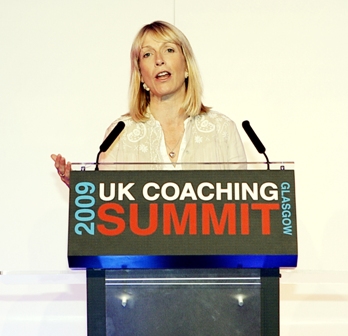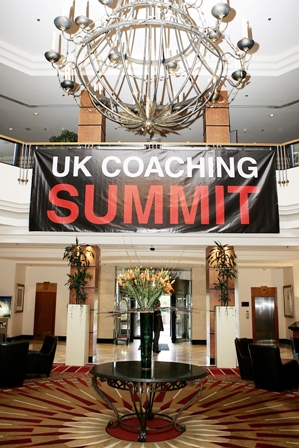
Jill Douglas does the coaching summit
Behind closed doors
With the UK Coaching Framework widening its influence towards the sharp end of coaching and the annual summit moved to Glasgow to engage the coaching community beyond England, Mick Owen asks what went on and why the press were not invited to witness it.
The excellent Andrew Marr has written a history of journalism in Britain, intertwined with the story of his own career, entitled My trade: A history of British journalism. It is consistently informative, occasionally dry and intermittently quotable. So much so that at The Leisure Review, when asked why we do it, we are prone to use his line: “A community which has no printed mirror of itself begins to disintegrate.” Although we acknowledge our artistic tendency to hyperbole, on this occasion we feel justified in uttering a gut-wrenching cri de coeur that Sportscoach UK (SCUK) have deprived the wider sport and leisure community of a valuable looking glass by excluding the press from their annual jamboree. The world of coaching is arcane at the best of times and the UK Coaching Framework (UKCF) is a particularly impenetrable example of esoteric knowledge enshrined in cryptic jargon. It also represents a fundamental change in the way coaches are educated, developed and henceforth deployed. So SCUK’s decision to keep its deliberations so close to its chest seems counter-intuitive. Our vexation is not that we missed out on the bacchanalia but that the people whom we seek to represent missed out on the chance to find out what’s going on.
Without doubt, the students and lecturers who subscribe to TLR, the leisure trust and county sports partnership managers who read the magazine and the competition and partnership development managers who leaf through our pages in the newsagent’s will all be affected by the seismic changes that the UKCF represents. The official website tells us that by 2016 there will be a 53% increase in the number of paid coaches in the system and about 93,000 more coaches in total available. Where will they be deployed? As “Governing Bodies of Sport with high-quality infrastructure [will] lead coaching in their sport” we can expect that national governing bodies (NGB) – who provided the preponderance of summiteers – will be employing some of them and deploying a great deal more. But as paid coaching becomes more prevalent so will the demand for paid coaching positions.
Schools are already besieged by commercial coaching companies with an eye on their PPE (planning, preparation, evaluation) budgets. Every town has its soccer camps, multi-sport baby-sitting programmes and commercial learn-to-swim companies. And who has to commission their services, ensure their quality and even regulate them? The NGBs? Not likely – they are Pontius Pilate-esque in their ability to slope the shoulder in this area. SCUK? Not their remit. No. It’s the local authorities’ centres, the county sport partnerships’ club and coach managers, and the Youth Sport Trust’s school partnerships that bear the brunt; and they weren’t in Glasgow.
And nor were we so we asked a few people how the event looked from their perspective? Jane Booth, the GB and Ireland training manager for the Professional Golfers’ Association said that: "A great variety of top-level speakers set the framework that stimulated some invaluable extra-curricular discussions that will definitely help to positively shape the coaching landscape in the UK in the next five... ten... fifteen... twenty years."
Her words were echoed by Matthew Williams, the national club and coach manager at the Amateur Boxing Association of England Ltd: “I found this year's UK Coaching Summit to be a very worthwhile event that provided much food for thought. It was interesting to see the progress that sports are making in implementing the UK Coaching Framework, and to use their experiences to inform and challenge our own practice. There seems to be a real sense of momentum and joint purpose amongst sports, and with the emerging coaching support networks everything points towards exciting times ahead for coaching in the UK."
And finally, Dave Johnson at the Rugby Football League offered this perspective: “A very professionally organised conference hosted by polite and friendly staff, providing good networking opportunities, the summit was useful in assessing progress made so far and identifying the next steps in the ‘Delivering the Goals’ phase of the UK Coaching Framework. The workshops were well structured, giving opportunity to consider the implementation of the framework within a variety of sports and highlighting the excellent work being carried out throughout the home nations. The production of the Coaching Workforce document was particularly significant in relation to work currently being carried out by the Rugby Football League (RFL) and the summit enabled the sport to share progress made in this area, especially with regard to the participant and coach development models and pathways."
All in all it seems like it was a very successful two days, well staged and well managed, that will continue the progress of the coaching framework. So why go down the route, pioneered in our sector by the Youth Sport Trust, of insisting on controlling both the event and the way it is reported? When we asked SCUK this we received the official line: “Demand to attend the summit from delegates was extremely high. Therefore, all capacity at the venue was dedicated to meeting delegate demand to attend. With this in mind we took the decision that communications to press would be made through a press release and web updates over the two days. We have provided further information and images for publications following the summit.”
If you want to read what the organising agency said happened in Glasgow you can get the official line at www.sportscoachuk.org.uk but it’s a bit short on jokes.
Mick Owen is managing editor of The Leisure Review and a qualified coaching practitioner.
The Leisure Review, June 2009
© Copyright of all material on this site is retained by The Leisure Review or the individual contributors where stated. Contact The Leisure Review for details.

